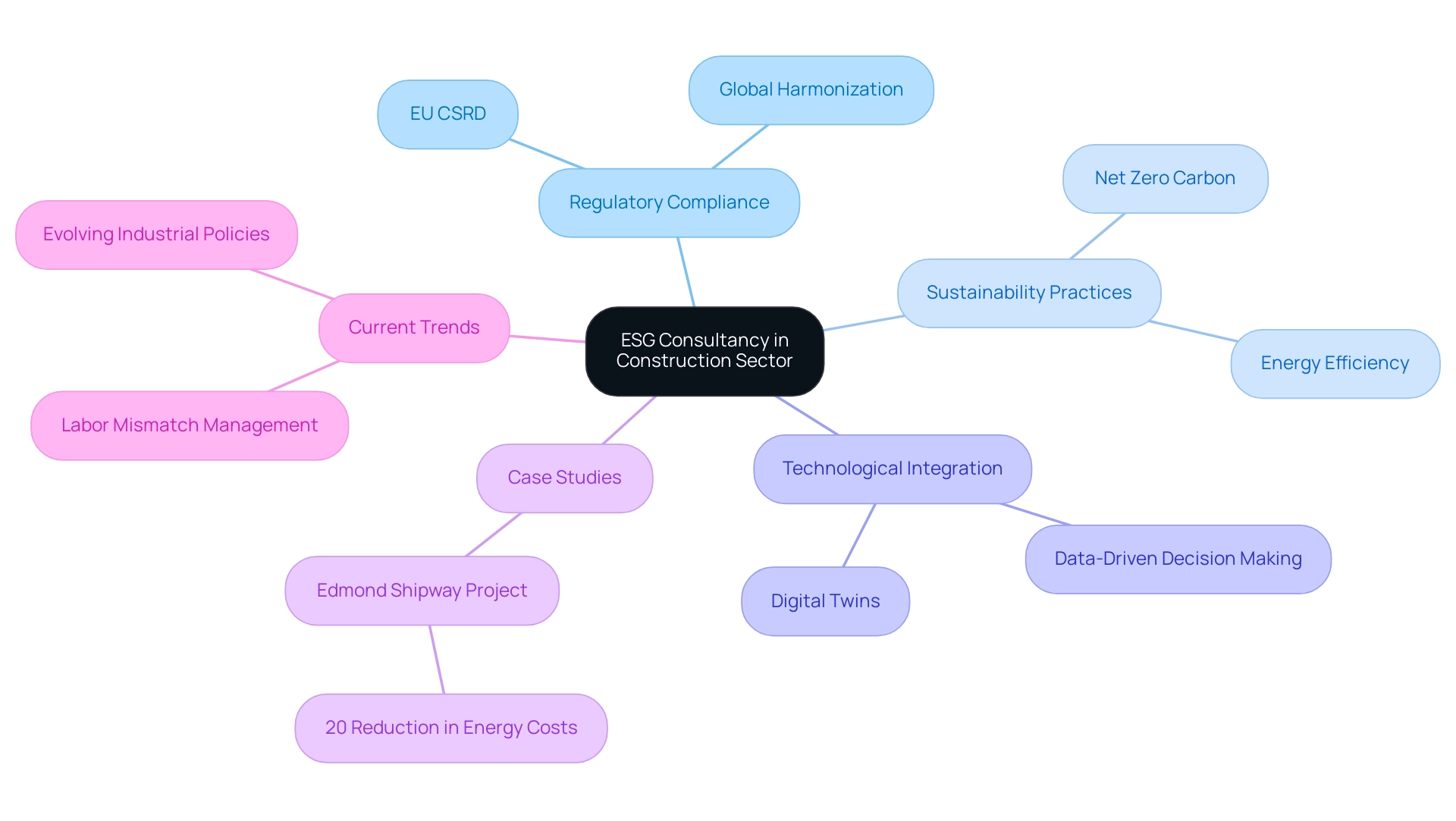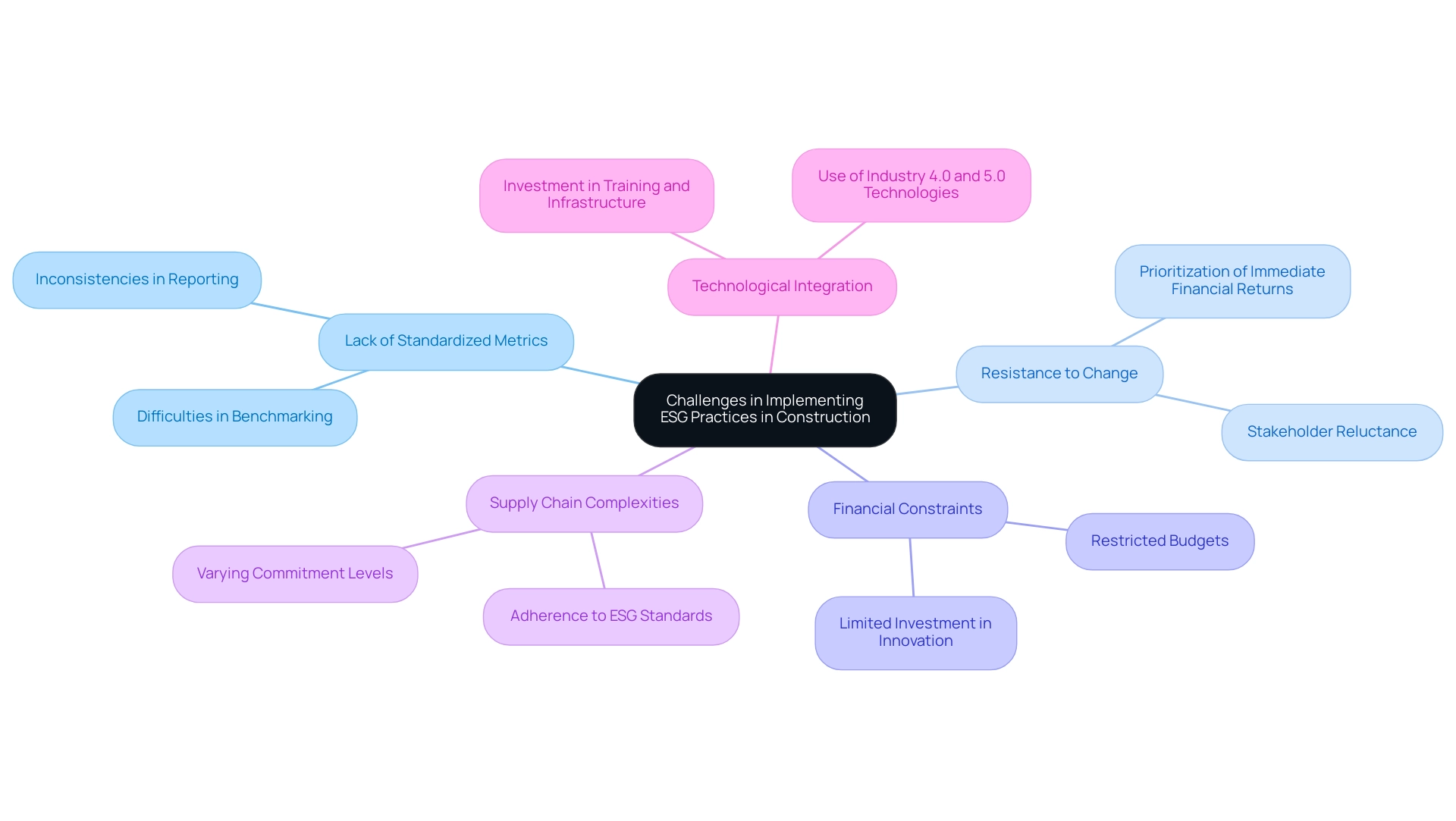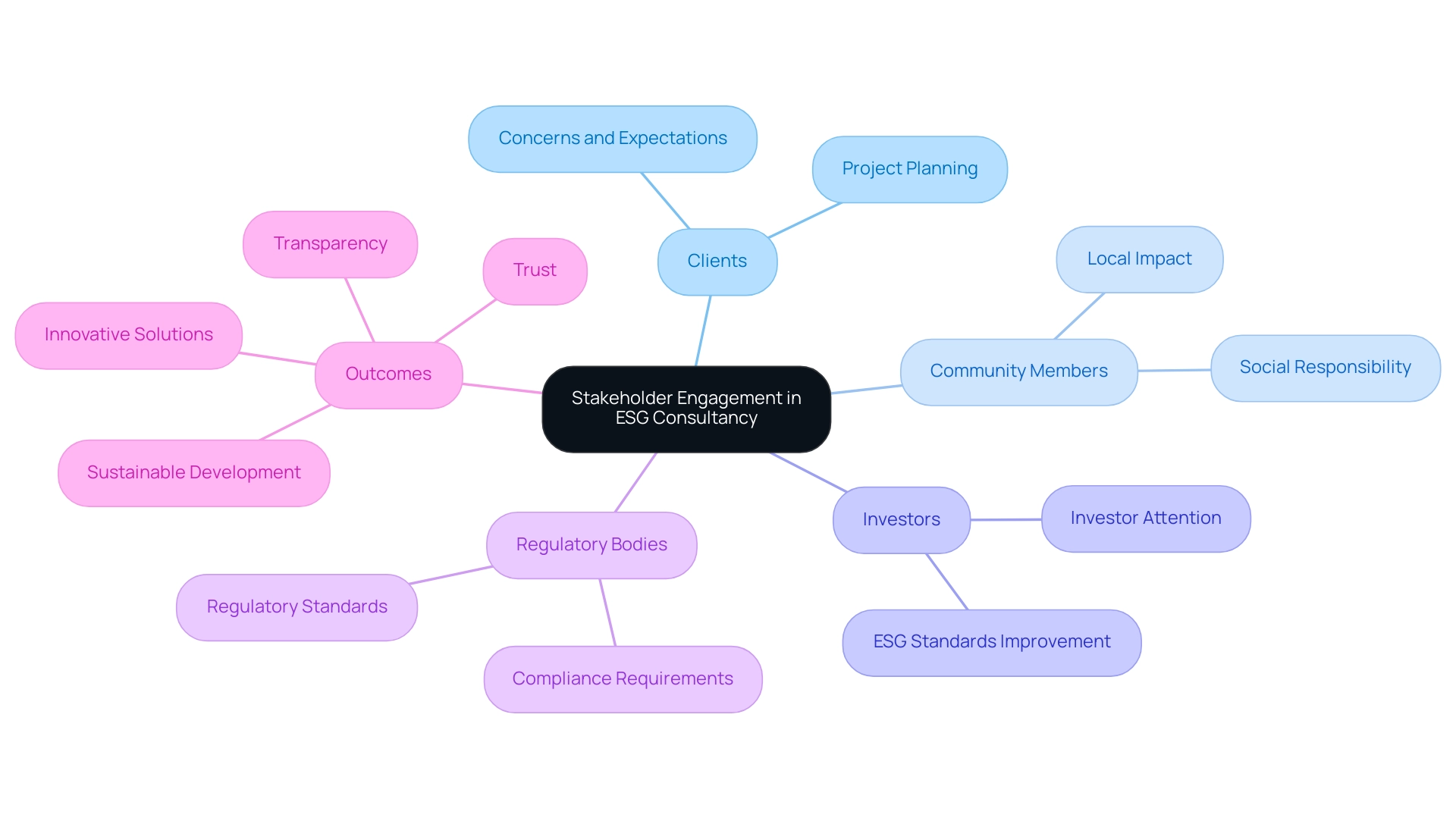27 Mar 2025
BlogOverview
ESG consultancy is crucial for construction stakeholders, as it integrates environmental, social, and governance principles into their operations. This integration not only ensures compliance with regulations but also promotes sustainability. Firms that adopt ESG strategies meet regulatory demands while enhancing operational efficiencies and building stakeholder trust.
Successful case studies exemplify this, demonstrating significant cost savings and improved project outcomes. By prioritising ESG principles, stakeholders position themselves to thrive in an increasingly regulated and environmentally conscious landscape.
Introduction
In an evolving construction sector characterised by increasing scrutiny and regulatory pressures, the integration of Environmental, Social, and Governance (ESG) principles has become a critical success factor. This article explores the multifaceted role of ESG consultancy within the industry, emphasising the urgent need for organisations to adopt sustainable practices that extend beyond mere compliance.
What challenges do firms face on this journey, and what opportunities for innovation and growth lie ahead? From fostering stakeholder engagement to navigating complex regulatory frameworks, the path toward sustainability is indeed fraught with challenges yet filled with potential.
As firms like Edmond Shipway spearhead efforts in promoting ethical governance and environmental stewardship, understanding the key drivers and future trends in ESG consultancy is essential for construction stakeholders aiming to thrive in a rapidly changing market.
Defining ESG Consultancy in the Construction Sector
In the building sector, ESG consultancy plays a pivotal role in guiding organisations to integrate environmental, social, and governance (ESG) considerations into their operational frameworks and decision-making processes. This consultancy is essential for promoting sustainability, ethical practices, and compliance with regulatory standards. In 2025, the building sector is under heightened scrutiny from stakeholders and regulatory bodies; thus, incorporating ESG principles is not merely advantageous but vital for long-term sustainability and success.
At Edmond Shipway, our sustainability consultancy focuses on strategies to achieve Net Zero Carbon, ensuring our clients not only comply with regulations but also excel in sustainable practices. Our Mechanical and Electrical Consultancy services are dedicated to building services that prioritise energy efficiency and the reduction of CO2 emissions—critical factors in today’s environmentally conscious market. The significance of ESG in the building sector is underscored by the growing demand for transparency and accountability.
Firms are increasingly expected to minimise their environmental impact, uphold social responsibility, and establish robust governance structures. For instance, the introduction of the EU’s Corporate Sustainability Reporting Directive (CSRD) requires companies to disclose sustainability-related issues, reflecting a broader trend towards enhanced reporting standards. This shift signifies a growing recognition that sustainable practices can lead to improved financial performance and foster stakeholder trust.
Moreover, there is a strong push for global harmonisation in sustainability reporting, which may face resistance due to regulatory overload. This highlights the necessity for building companies to adapt proactively.
Successful integration of ESG principles is evident in various case studies within the sector. Companies that have embraced comprehensive ESG strategies report not only compliance with emerging regulations but also notable operational efficiencies and enhanced reputational capital. A recent project led by Edmond Shipway exemplified this, as our innovative cost consultancy practices, combined with a focus on sustainability, achieved a 20% reduction in energy costs for a major hospitality developer.
As the building landscape evolves, firms are increasingly leveraging technology to create ‘digital twins’—integrated models that encompass physical, operational, and intelligent aspects of projects. Companies are likely to continue developing to a ‘whole digital twin’ concept, which facilitates better decision-making and resource management, aligning with ESG objectives.
Current trends in ESG consultancy emphasise managing labour mismatches, increasing technological integration, and adapting to evolving industrial policies. With the building sector anticipating moderate growth, buoyed by favourable monetary policies and slowing inflation, the role of ESG consultancy becomes even more critical.
At Edmond Shipway, our expertise in project management and cost consultancy empowers us to assist developers in navigating complexities and seizing emerging opportunities, ultimately leading to improved project outcomes and client satisfaction.
In summary, the importance of ESG consultancy in the building sector cannot be overstated. It not only aids firms in meeting regulatory requirements but also cultivates a culture of sustainability and ethical governance—an expectation increasingly voiced by clients and stakeholders alike.

Key Drivers of Growth in ESG Consultancy
Several pivotal factors are propelling the growth of ESG consultancy in the building industry. A significant increase in climate change awareness has led companies to embrace sustainable practices, recognising the urgent need to mitigate environmental impacts. This shift is not merely a trend; it reflects a broader societal commitment to sustainability that is reshaping industry standards. But what drives this transformation? Investors are playing a crucial role.
In 2025, a substantial portion of institutional investors will prioritise ESG factors in their investment strategies, demanding greater transparency and accountability from building companies. Moreover, the regulatory landscape is evolving, with stricter compliance requirements for environmental and social governance becoming commonplace. These regulations compel building companies to align their operations with emerging standards, further driving the demand for ESG consultancy.
Edmond Shipway exemplifies how a commitment to excellence and innovative solutions can enhance project outcomes and client satisfaction. Their Mechanical and Electrical (M&E) consultancy focuses on energy efficiency and reducing CO2 emissions, which is crucial for achieving a Net Zero Carbon future. By incorporating energy efficiency into their cost consultancy, Edmond Shipway not only assists clients in reducing energy expenses but also promotes sustainable building methods.
Their project management methodologies emphasise meticulous planning, effective scheduling, and continuous monitoring, ensuring that projects are delivered on time and within budget. Edmond Shipway’s dedication to quality and professionalism has consistently delivered outstanding results. Their focus on high-quality services and strong client relationships positions them as a leader in the ESG consultancy space, effectively meeting the expectations of both investors and regulators. Understanding the complexities of market dynamics and translating insights into actionable recommendations is crucial in the ESG consultancy field. The competitive environment is increasingly shaped by institutional investors who are insisting on sustainable methods from building companies.
Together, these components create a robust market for ESG consultancy, as building firms aim to integrate sustainable methods that enhance project outcomes and establish them as leaders in a rapidly changing industry landscape.
Challenges in Implementing ESG Practices in Construction
Implementing Environmental, Social, and Governance (ESG) approaches within the construction industry presents significant challenges that necessitate strategic navigation, often facilitated by an ESG consultancy. A primary obstacle is the lack of standardised metrics for measuring ESG performance, which frequently leads to inconsistencies in reporting and accountability across projects. This absence of uniformity can impede effective benchmarking and comparison, complicating efforts for firms to demonstrate their commitment to sustainability.
Furthermore, resistance to change from various stakeholders constitutes a formidable barrier. Many individuals and organisations prioritise immediate financial returns over long-term sustainability goals, creating a conflict that can hinder progress. Financial constraints exacerbate these issues, as restricted budgets limit investments in innovative technologies and sustainable methods essential for achieving ESG objectives.
Notably, a survey indicated that 41.67% of participants had up to 5 years of experience of ESG in the building industry, underscoring a potential gap in familiarity with ESG practices and challenges.
The intricate nature of supply chains in construction adds another layer of complexity. Ensuring that all partners and subcontractors adhere to ESG standards is challenging, particularly when different entities exhibit varying levels of commitment and capability regarding sustainability.
Addressing these challenges is crucial for enhancing ESG implementation with the assistance of an ESG consultancy and contributing to the achievement of multiple Sustainable Development Goals. Recent case studies highlight the role of technological integration in ESG reporting, showcasing how Industry 4.0 and 5.0 technologies can enhance data transparency and efficiency. However, the successful implementation of these technologies requires substantial investment and a commitment to training and infrastructure development.
As the building industry progresses toward 2025, it is imperative for stakeholders to foster a culture of sustainability and accountability. By overcoming resistance to change and embracing standardised metrics, the industry can more effectively measure and report on ESG performance through ESG consultancy, ultimately leading to more sustainable building methods.

Exploring ESG Services Tailored for Construction Projects
In 2025, consultancy services focused on ESG have become increasingly vital for building projects, encompassing a diverse array of offerings designed to meet the unique challenges of the industry. Key services offered by Edmond Shipway include comprehensive environmental impact assessments that evaluate the potential effects of building activities on the environment, ensuring adherence to evolving regulations and promoting sustainable practices. Social value assessments and governance audits further enhance project integrity, allowing companies to align their operations with broader societal goals and stakeholder expectations.
The integration of ESG principles is no longer optional; it is essential for building companies to thrive in today’s market. Consultants at Edmond Shipway play a crucial role in advising building companies on sustainable material selection, management strategies, and energy efficiency measures. These initiatives not only help organisations meet regulatory requirements but also contribute to a positive corporate image and increased stakeholder trust.
The financial commitment associated with ESG services is notable, this investment underscores the significance of comprehensive ESG strategies for building companies, particularly in the hospitality sector, where Edmond Shipway specialises in providing tailored solutions.
Training programmes focused on ESG principles and practices are essential for cultivating a culture of sustainability within organisations. By equipping personnel with the knowledge and skills necessary to execute ESG strategies efficiently, companies can improve their operational performance and foster long-term success.
The impact of environmental evaluations in building projects is profound, as evidenced by recent case studies highlighting successful implementations. For example, a notable project in the UK demonstrated how thorough environmental impact assessments led to the identification of critical ecological considerations, ultimately resulting in a design that minimised disruption to local wildlife habitats. Such proactive measures not only comply with regulations but also enhance the project’s overall sustainability profile.
Additionally, the recent extension for businesses to adhere to new climate reporting regulations under the Climate Corporate Data Accountability Act illustrates the evolving regulatory environment that building companies must navigate.
As the building industry continues to evolve, the demand for tailored ESG services is expected to grow. Statistics indicate that firms investing in comprehensive ESG strategies are likely to see improved project outcomes and increased investor confidence. By prioritising these services, building firms can navigate the complexities of the modern regulatory landscape while contributing positively to their communities and the environment.
Edmond Shipway’s ESG consultancy is well-positioned to support clients in these projects, ensuring that they not only meet compliance standards but also excel in their sustainability goals.
The Role of Stakeholder Engagement in ESG Consultancy
Stakeholder engagement is pivotal to the success of consultancy in the ESG sector of the building industry. By actively involving a diverse range of stakeholders—including clients, community members, investors, and regulatory bodies—construction companies can ensure that their concerns and expectations are integral to project planning and execution. This collaborative approach not only enhances transparency but also builds trust and accountability among all parties involved.
In 2025, statistics indicate that stakeholder involvement in ESG projects related to building has become increasingly significant, with a marked increase in investor attention driving improvements in ESG standards, particularly among private enterprises and key companies. Engaging stakeholders allows companies to identify potential ESG risks and opportunities early in the process, leading to more sustainable and socially responsible outcomes.
The importance of stakeholder engagement is further underscored by its ability to enhance outcomes in ESG consultancy. Successful collaboration can lead to innovative solutions that address environmental and social challenges, ultimately benefiting both the project and the community. For instance, research has shown that effective stakeholder engagement correlates with improved ESG performance, as seen in various case studies where firms that prioritised stakeholder collaboration achieved superior results in their ESG initiatives.
One notable case study highlights the positive impact of stakeholder engagement on corporate green innovation, demonstrating that companies with robust ESG performance are more likely to innovate sustainably. This trend is particularly evident in the real estate and development sector, which boasts the highest ESG ratio at 11.2%, reflecting the industry’s commitment to integrating stakeholder perspectives into their ESG strategies.
As the building landscape evolves, the focus on stakeholder engagement in the realm of ESG consultancy will continue to increase, influencing the future of sustainable development methods and ensuring that projects not only meet regulatory standards but also benefit society and the environment.

Future Trends in ESG Consultancy for Construction Stakeholders
The future of ESG consultancy in the building industry stands on the precipice of transformative change, with Edmond Shipway at the forefront of this evolution. The escalating global focus on climate change has catalysed a pronounced shift towards net-zero building practices and significant carbon footprint reduction. By 2025, building companies are likely to face increasingly stringent regulatory frameworks that will necessitate the adoption of robust ESG strategies.
This evolution transcends mere regulatory compliance; it embodies a broader commitment to sustainability that resonates deeply with stakeholders. Technology is poised to be a pivotal driver in this transformation. The integration of advanced data analytics and artificial intelligence is set to revolutionise ESG reporting and performance tracking, allowing companies to extract actionable insights from complex datasets. A notable trend is the emergence of ‘smart enterprises,’ where automation solutions significantly enhance operational visibility and efficiency.
In 2024, 67% of businesses reported leveraging such technologies, underscoring the industry’s shift towards data-driven decision-making. Organisations like Tesla have successfully implemented hyper-automation, resulting in a 30% reduction in production expenses and a 40% increase in efficiency. This highlights the tangible advantages of automation that could be mirrored in the building industry. As stakeholder expectations continue to rise, companies within this sector must prioritise transparency and accountability in their ESG initiatives.
This endeavour extends beyond compliance; it is about cultivating trust and demonstrating a genuine commitment to sustainable practices. The push for interoperability in sustainability reporting, illustrates the industry’s demand for cohesive and meaningful reporting standards. Yet, there may be resistance to regulatory overload and scepticism regarding the efficacy of reporting as regions embrace new standards.
In the realm of net-zero building practices, case studies from leading companies reveal the tangible benefits of adopting these strategies. Companies that have embraced innovative building techniques and sustainable materials report not only compliance with emerging regulations but also enhanced project efficiency and reduced costs. As the landscape evolves, the ability to adapt to these trends will be crucial for building companies striving to maintain a competitive edge in the market.
Conclusion
The integration of Environmental, Social, and Governance (ESG) principles in the construction sector has become essential for organisations facing increasing regulatory scrutiny. ESG consultancy plays a pivotal role in guiding firms, such as Edmond Shipway, to adopt sustainable practices that not only ensure compliance but also enhance operational efficiency and reputation.
While the benefits of ESG implementation are clear, challenges persist. The lack of standardised metrics, resistance from stakeholders, and financial constraints can impede progress. However, by fostering a culture of sustainability and accountability, firms can overcome these barriers and align their operations with regulatory expectations and societal demands. Engaging stakeholders is crucial; collaborative efforts lead to innovative solutions and improved ESG outcomes.
Looking to the future, ESG consultancy in construction is poised for transformation driven by technology and evolving regulations. Embracing data analytics and automation can enhance transparency in ESG reporting, building trust with stakeholders. A commitment to net-zero practices and sustainable construction methods will not only ensure compliance but also improve project outcomes and financial performance.
In conclusion, adopting ESG principles is not merely about meeting regulatory requirements; it is a strategic necessity for success in a rapidly evolving market. By leveraging ESG consultancy and embracing innovative practices, construction firms can effectively navigate challenges while seizing opportunities for growth and leadership in the industry.
Share


